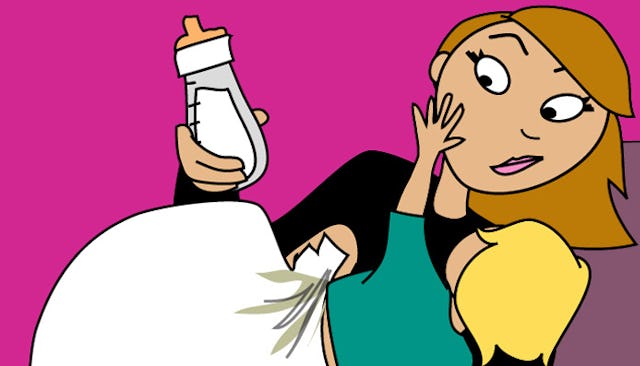7 Postpartum Symptoms Your OB Might Forget To Mention

Thinking about having another baby? In the interest of fully educated decision-making, we’ve outlined a few post-birth conditions that might be missing from your pre-baby prep reading. Episiotomy schmesiotomy, here are the postpartum symptoms that are really gonna hurt.
1. Postpartum Discharge Disorder
The paralyzing anxiety that hits both mom and dad as soon as they wave buh-bye to the nursing staff in the maternity unit and pass through the hospital’s sliding glass doors and out into the parking lot to buckle their newborn into his car seat for the drive home. One or both parents may be given to repeating, “Why would anybody let us take a baby home?” while banging their heads against the car window.
2. Momsomnia
Also known as sleeping for the rest of your days with one ear on alert for sudden wails, coughs, and in later years, the squeak of a bedroom window sliding open to allow a teen to slip out at night. Sleep deprivation generally starts the night you bring your baby home (or after the really good drugs wear off ) and continues until your child is making regular mortgage payments on their own. This condition affects 10 out of 10 mothers. Fathers are unaffected; the Y chromosome has a protective effect against this disorder.
3. Chromatic Coordination Syndrome
The compulsion to match a new baby’s outfit to her hair ribbons, shoes, binkies, stroller blanket, and in severe cases, the stroller itself. This obsession is considered a newcomer to the growing list of social (media) diseases and typically develops after binge-browsing Pinterest boards like “My Imaginary Well-Dressed Toddler.” The syndrome can often go undetected for weeks or months but becomes noticeable when a parent cannot bring herself to “just throw on a onesie already, and let’s go!”
4. Parental Separation Anxiety Attacks
Sudden parental separation anxiety (PSA) attacks often blindside new parents who sincerely believe they are desperate to leave the baby with a sitter and have some grown-up time, but aren’t really ready to let go. In the grip of such an attack, a parent (usually Mom) may sneak off to the restroom to check in with the babysitter every 10 minutes, leading those around her to wonder if she has a UTI or something. In extreme cases, a parent having a PSA attack will grab anything in the vicinity that is remotely baby-shaped—a sack of flour, balled-up sweater, couch cushion—to create a faux bundle to rock in her arms.
5. Sensory Obliteration Syndrome
Known simply as SOS, this condition occurs when the body attempts to rebalance the heightened senses associated with pregnancy and tips too far into the desensitization zone. SOS often develops in tandem with Momsomnia and becomes noticeable when the baby is 6 to 8 weeks old. By that time, moms are generally staggering around like zombies, unaware of much beyond the baby’s need to be fed or changed. It’s not uncommon for things like wicked BO or spit-up in the hair to go unnoticed for days.
6. Cranial Inhalation Compulsion
Going by innocuous names like “whiffing” or “huffing,” cranial inhalation is on the rise among parents irresistibly drawn to the feelings of euphoria associated with sniffing babies. Baby aroma is highly addictive, and huffers have been known to lose interest in all other activities. Some will sit for hours, breathing in the intoxicating scent of freshly bathed babies while ignoring their Netflix queue and allowing their Facebook feed to atrophy. If you need help, dial 1-888-BABY-HUF or tweet @SniffMyBaby.
7. Acquired Distraction Disorder
Marked by an impatient “now, what were we talking about?” Acquired Distraction Disorder (ADD) is the progressive loss of the ability to follow a train of thought. ADD typically develops among parents with toddlers who’ve just learned how to run. The adult brain becomes overwhelmed with the strain of excessive multitasking and begins shutting down “nonessential” functions to conserve energy for chasing tiny humans intent on leaping from garden walls and licking electrical outlets. Fortunately, ADD lasts only until middle school, when children stop interacting with their parents altogether.
Excerpted with permission from Science of Parenthood: Thoroughly Unscientific Explanations for Utterly Baffling Parenting Situations, published this month by She Writes Press. It’s hilarious – go buy it!
This article was originally published on